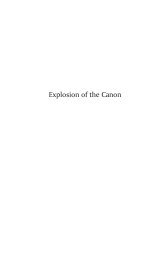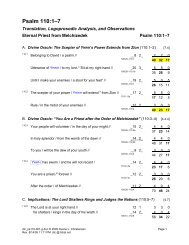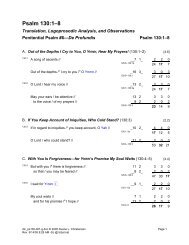Reading Genesis 1-2 in Hebrew - Bibal.Net
Reading Genesis 1-2 in Hebrew - Bibal.Net
Reading Genesis 1-2 in Hebrew - Bibal.Net
Create successful ePaper yourself
Turn your PDF publications into a flip-book with our unique Google optimized e-Paper software.
<strong>Read<strong>in</strong>g</strong> <strong>Genesis</strong> 1–2 <strong>in</strong> <strong>Hebrew</strong><br />
��������������„����Œ����û���‘������������������•œ•�—transliteration:<br />
way-yaµ-vaW 'È-lO-hÓµm 'et-H¸-n µ<br />
ham-m¸-'O-rOµt haG-G¸-dO-lÓµm, “and Elohim made the two great lights.” The verb here is Qal<br />
imperfect 3 rd sg. masc. with wau-conversive from the root hWv (“make, do”) with Elohim as the<br />
subject. The noun £y¬n¯H (“two”) appears here <strong>in</strong> the plural construct state with the noun ��„����Œ��<br />
(“lum<strong>in</strong>aries”) written, once aga<strong>in</strong>, defectively (cf. 1:14). The pl. masc. adjective £yilOdC¯gah (“the<br />
great”) <strong>in</strong>dicates that the noun rÙ'Am (“lum<strong>in</strong>ary”) is masc. even though it appears <strong>in</strong> the plural<br />
with what appears to be a fem<strong>in</strong><strong>in</strong>e end<strong>in</strong>g, which is written here defectively.<br />
���œ���������������������������‹��Œ��‘���—transliteration:<br />
'et-ham-mA-'Ùµr haG-GA-dOµl l¸-mem-Heµ-let<br />
hay-yÙµm, “the greater light for dom<strong>in</strong>ion of the day.” The def<strong>in</strong>ite direct object marker -te'<br />
<strong>in</strong>dicates that what follows is the object of the verb WavCayaw (“and he made”) at the beg<strong>in</strong>n<strong>in</strong>g of this<br />
verse. Note that the sg. masc. adjective �������� (“the great”) is written defectively. The fem. noun<br />
hAlAHÕmem (“rule, dom<strong>in</strong>ion”) appears here <strong>in</strong> the construct state with the def<strong>in</strong>ite noun £ÙCyah (“the<br />
day”). Note the stress <strong>in</strong> the word ������������,<br />
which falls on the penult. The l is the preposition, m<br />
is the formative prefix, t the fem<strong>in</strong><strong>in</strong>e end<strong>in</strong>g from the root lHm (“rule, have dom<strong>in</strong>ion”).<br />
����������ƒ����„ �����������Å����������������������������‹��Œ��‘�����—transliteration:<br />
w¸-'et-ham-mA-'Ùµr<br />
haq-qA-XOµn l¸-mem-Heµ-let hal-laµy-l‰ w¸-'Eµt haK-KÙ-kA-bÓµm, “and the lesser light for the dom<strong>in</strong>ion<br />
of the night, and the stars.” The repetition of the def<strong>in</strong>ite direct object marker t'w twice here<br />
<strong>in</strong>dicates that the entire clause functions as the direct object of the verb WavCayaw (“and he made”) at<br />
the beg<strong>in</strong>n<strong>in</strong>g of this verse. The sg. masc. form of the adjective §OXAq (“small, lesser”) confirms<br />
aga<strong>in</strong> that the noun rÙ'Am (“lum<strong>in</strong>ary”) is mascul<strong>in</strong>e. Note aga<strong>in</strong> that the stress <strong>in</strong> the word ����������<br />
(“the night”) falls on the penult. Note that the noun ���������ƒ�� (“the stars”) has two occurrences of<br />
meteg, the second of which is the accent sill˚q.<br />
������������������������„<br />
�������_<br />
������û<br />
�������������������������„<br />
�������ô������û���œ•���1:17�<br />
���������‘������„ ����������<br />
���œ•��—transliteration: way-yiT-TEµn 'O-tAµm 'È-lO-hÓµm Bir-qÓµ-av<br />
haH-HA-maµ-yim, “and Elohim put them <strong>in</strong> the dome of the sky.” The verb �û<br />
���œ•�� is Qal imperfect 3 rd<br />
sg. masc. with wau-conversive from the root §tn (“give, put, set”) with Elohim as subject. The<br />
def<strong>in</strong>ite direct object marker with 3 rd pl. masc. suffix �_”��� is the direct object of the verb. On the<br />
mean<strong>in</strong>g of £yamKAHah avyiqAr (“dome of the sky”) see discussion at 1:6. The preposition b (“<strong>in</strong>”)<br />
before shewa is po<strong>in</strong>ted with ñ–ib hireq.<br />
���������‘������„ ������—transliteration: l¸-hA-'Óµr val-hA-'Aµ-rec, “to give light upon the earth.” The<br />
verbal form ��„ ������ is Hiphil (causative) <strong>in</strong>f<strong>in</strong>itive construct from the root rw' (“be[come] light”).<br />
© 2005 BIBAL Corporation, All Rights Reserved Version 1.0<br />
12





